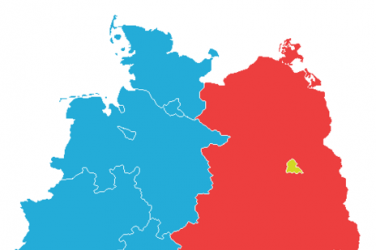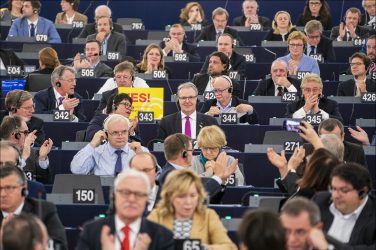E&M Author Janina Kehrer takes a closer look at the ability to remember important, surprising or terrifying historical moments – not only as individuals but also as a whole society.
Where were you on September 11th, 2001? Do you remember? So do I. And so does nearly every person around the globe who has lived through a memorable age. Few other dates in history are remembered that intensely. Do you remember the date on which Neil Armstrong sat his foot on the moon? If yes – congrats! I had to look it up.
The phenomenon behind the fact that everyone knows where they were on 9/11 is often described as a flashbulb memory. This concept was firstly described by Roger Brown and James Kulik in their 1977 article “Flashbulb memories”. They explain flashbulb memories as memories that form when first faced with events that are unexpected and emotionally highly intense or meaningful. The resulting flashbulb memories include where the memory owner was when they heard the news, who or what brought the news to them, what they were doing at that moment and how it made them feel. As a prototype case, Brown and Kulik named the death of John F. Kennedy, who got shot on November 22nd, 1963, and described the fact that nearly every person could remember most details about their location and what they were doing upon hearing the news, and the manner in which they were informed of the murder.
while a flashbulb memory can be formed if a positive event is highly impactful, it is undisputed that negative events are much more shocking and therefore more likely to be saved in our emotional memory
Of course, the importance and awareness of particular historical events varies across different parts of the world. Everyone in Germany probably knows what happened on November 9th, 1989, the day the Berlin Wall fell, while everyone in Norway probably remembers the date of July 22th, 2011, when Anders Breivik committed his terrible attacks.
But what distinguishes a regular memory from a flashbulb memory? Brown and Kulik named two variables that seem to be responsible for the formation of flashbulb memories: a high level of surprise and a high level of consequentiality. The surprise factor in particular seems to be essential, as it seems to primarily distinguish positive from negative flashbulb memories.
The problem with positive flashbulb memories therefore is that it’s unclear whether they even exist. While bad occurrences nearly almost come as surprises (accidents, terror attacks), positive events are usually not that surprising (royal weddings, the moon landing). We normally have time to prepare for them, therefore we are not hit by their unexpectedness. But they nevertheless have an impact on us and on our history, so the second factor – consequentiality – is fulfilled. Therefore, while a flashbulb memory can be formed if a positive event is highly impactful, it is undisputed that negative events are much more shocking and therefore more likely to be saved in our emotional memory – and in the memories of nearly everyone else.
Sadly, there have been a lot of very tragic events in the past that led to the formation of powerful flashbulb memories across generations. The most significant since the new millennium has been 9/11, the consequences of which are still impacting the entire world today. Because of this not only people living in the USA, but people from all around the globe remember this date very clearly.
What are some meaningful flashbulb memories that occurred in the 21st century? In order to answer this question, I created a small survey that was answered by about 100 people of different ages living in Europe.
Which flashbulb memories do we share?
As I am from Germany myself, I was especially interested in comparing my flashbulb memories with other people’s memories of the same cultural circles. So I created a survey for German-speaking people currently residing in Europe. The age range of respondents was broad, but most of them were between 20 and 40 years old, with a few over 40 and a few under 20 years old. Most of the participants are living in Germany right now, but some are also living in other European countries (Austria, Switzerland, Spain). The vast majority of respondents were born in Germany, with a few also born in different countries (Afghanistan, Hungary, Switzerland, South Africa, Armenia, Italy, Somalia, Russia, Kazakhstan and Poland). 74% of respondents declared themselves to be female, 26% to be male, and no respondents identified themselves as non-binary or other.
The survey featured the following six events of the 21st century, which were selected to be a mixture of positive and negative events as well as relating to politics and terror, sports or pop culture:
- Attacks on the World Trade Center: September 11th, 2001
- Death of Michael Jackson: June 25th, 2009
- Male German football team wins the world cup: July 13th, 2014
- Marriage of Prince William and Kate Middleton: April 29th, 2011
- Attacks in Utøya, Norway: July 22nd, 2011
- Russian invasion of Ukraine: February 24th, 2022
The respondents were asked whether they can remember the exact date of the events and whether they can describe the circumstances in which they learned of the event. The following graphic shows which events the respondents stated to remember the date of.
One thing immediately strikes: The attacks on the World Trade Center as well as the beginning of the Russian invasion of Ukraine seem to be the most memorable events in this group by far. Only very few people remembered the dates of Michael Jackson’s death or Prince William and Kate Middleton’s marriage. These events may only have an emotional effect on a very small group of people and an even lower effect on the consequential side. It also surely makes a difference whether an event concerns one’s own country or elsewhere – which probably explains at least in part the low recall rates by respondents for the exact date of the Attacks in Utøya.
The attacks on the World Trade Center and the beginning of the Russian invasion of Ukraine can be considered to be the two events with the highest level of consequentiality. But considering that the beginning of the Russian invasion happened only months ago, making it easier to remember, and that its clear “beginning” is a bit complex, 9/11 remains unchallenged in terms of memorability.
By looking at the survey results it becomes very clear that not only is the date of 9/11 the most remembered, but so are the circumstances of the respondents hearing of it for the first time. Almost 50% were able to describe how they heard of the event, where they were or who brought the news to them. Like one subject describes: “It was my first day in secondary school. A teacher told us what happened. We were allowed to go home where I watched everything on TV.”
“9/11 cannot be forgotten because it turned out to be a synonym of a new era.”
The same applies for the Russian invasion of Ukraine, but the participants could describe the circumstance of the news reaching them in much less detail, perhaps also due to the fact that most of the people were informed very quickly through social media. Also less detailed were the descriptions of the other events, with slightly more memories of the moment when the German football team won the world championship. One participant says: “I remember exactly which people watched the game with me. I also remember the exact minutes of play, who scored the goal, who prepared it. And that I couldn’t sleep during the following night.” But there are only a few detailed memories regarding the death of Michael Jackson or the marriage of Prince Harry and Kate Middleton, events about which many people also stated a lack of interest. As expected and stated by Brown and Kulik, not only surprise but also consequentiality make events more likely to result in flashbulb memories.
The explanation of one of the participants may hit the nail on the head: “9/11 cannot be forgotten because it turned out to be a synonym of a new era.” Maybe the fact that the date became part of the name of that tragic event makes it nearly impossible to forget. But not only the name seems remarkable, also the long lasting, tragic consequences are affecting us until the present day. And maybe we felt this right away, which made us remember that shocking moment, as this participant describes it: “I came home when my father told me there was something terrible on TV. Suddenly the second plane hit the tower and the journalist changed his headline from “terrible accident” to “America is under attack”.”
Many memories about learning of the beginning of the military invasion of Ukraine were also very clear, like this respondent wrote: “It was February 24th and I was sitting in the subway on my way back home from a test at university. I received the news through social media and immediately recognized what was going on.” Asked about their clear and detailed memories of other events, people often also mentioned the death of Princess Diana (1997), the tsunami in Sri Lanka (2004) or the terrorist attacks in Paris (2015).
Going through all these interesting, fascinating and terrifying memories, leaves me with a strong wish to also share some positive flashbulb memories with the rest of the world. So let’s hope that someday we will cheer the achievement of climate targets or find ourselves in euphoric jubilation over plastic-free oceans. Or just over the end of a war. It would be great to remember this together.
Cover photo by Aidan Bartos.
Further reading: Roger Brown, James Kulik, Flashbulb memories, Cognition, Volume 5, Issue 1, 1977, Pages 73-99, ISSN 0010-0277.








